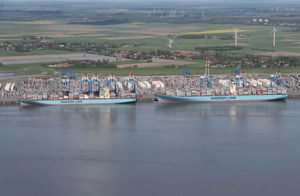 The Maersk group is eyeing increased digitalization that will see booking with the giant liner company taking place in mere seconds, saving time and cutting costs, according to a senior Maersk executive.
The Maersk group is eyeing increased digitalization that will see booking with the giant liner company taking place in mere seconds, saving time and cutting costs, according to a senior Maersk executive.
There is an increasing need to transform the container business through digitalization and Maersk is moving in that direction, said Rene Piil Pedersen, group representative for Asia Pacific of Maersk, at a recent roundtable discussion in Singapore, as reported by S&P Global Platts.
“This is a huge opportunity for Maersk. Until around three years ago making a booking with us required a couple of hours, now it is in minutes and by next year we want to reduce it to as low as five seconds,” Pedersen said.
A better cost structure around the containers, container ships, terminals, and cranes could reduce the overall costs of handling cargoes, he added.
Pedersen cited a case study Maersk did sometime ago, in which tracking a cargo of flowers and avocados from East Africa to Northern Europe revealed involvement of close to 200 sets of documentation or paperwork and engagement with 30 different entities.
“The future lies in using a much more transparent and efficient process to dealing with these entities called the block chain technology which will be seamless and save time and costs,” he said.
Meanwhile, he predicted that box shipping prospects for the short term are unpredictable because even as market demand is rising, there will be more deliveries of newbuilds.
“The next two years would be tricky because demand would increase but a lot of ships will hit the water,” he warned.
Cargo volumes moved in container ships are expected to grow 2% to 4% this year, up from around 1.5% to 2% in 2016, as the industry capitalizes on a revival in demand in the U.S., Europe, China, and major oil exporting countries, said the report.
“The economy in both Europe and US is picking up though it is not back to the heyday, there is a lot of talk of Chinese economy growing. The oil export-dependent economies in West Africa and South America will benefit for the increase in crude prices,” Pedersen explained.
But while the demand for container ships is rising, there is a large overall global program of newbuilds and “there is a big question of how that capacity will be managed,” he said.
Maersk alone will take delivery of nine 14,000-TEU and eleven 19,000-TEU new container ships this year, Pedersen said. The company has not placed any new orders so far this year.
The supply and demand for container ships is now more balanced but better capacity management will be required, Pedersen said. “Some consolidation in the container shipping sector has been announced but these are early days and it is yet to take effect.”
He hinted that consolidation is the way to go and so far the extent remains small, and that increased integration is needed.
“If one has to survive, it has to offer a global product. You can’t be a small fish in a big lake,” Pedersen said. “The consolidation is not huge, the top 20 container shipping companies have now become the top 12. There are still a lot of small players.”
So far, consolidation has created the Ocean Alliance that was expected to begin operations April 1 and includes the Evergreen Line, CMA CGM, Cosco China Shipping, and Orient Overseas Container Line, said Platts.
Another grouping, called THE Alliance, has brought together members Hapag-Lloyd, Yang Ming, MOL, NYK Line, and ‘K’ Line.
Maersk and Mediterranean Shipping Co., the two market leaders by deployed capacity, already have a 2M Alliance in place. The two companies also have a strategic cooperation agreement with Hyundai Merchant Marine or HMM, said Platts.
Photo: Walter Rademacher





